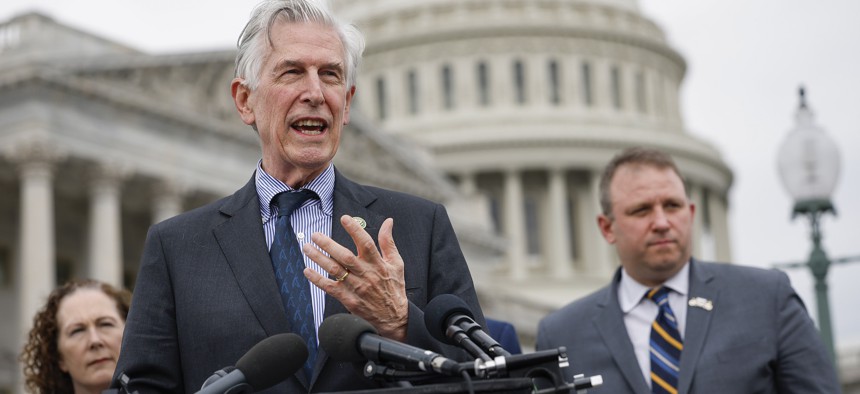
Rep. Don Beyer, D-Va., speaks at a press conference on federal workforce rights outside the U.S. Capitol on March 28, 2025. Beyer is introducing two federal workforce bills. Kevin Dietsch / Getty Images
Federal employees removed by Trump would have easier pathway back to government service under Democratic bill
A pair of bills would seek to give hiring preference to axed feds and to standardize the length of probationary periods for government workers, as the administration has sought to fire those individuals who have less civil service job protections.
Rep. Don Beyer, D-Va., who represents more than 72,000 federal workers, is introducing legislation to make it easier for government employees removed under the Trump administration to rejoin agencies and to deter a future president from undertaking a mass firing of the workforce.
The Restoring Employment and Hiring Incentives for Removed Employees (REHIRE) Act would deem any federal employee who was involuntarily removed during the period between Jan. 1, 2025, and Jan. 1, 2027, as preference eligible for competitive service appointments, a special candidate consideration in the federal hiring process normally afforded to veterans or their family members.
Such a requirement would not apply to political appointees or individuals who were removed for misconduct, delinquency or whose most recent performance review was "unacceptable or less than fully successful.”
Alongside the REHIRE Act, Beyer also introduced the Probationary Reduction for Employee Protections (PREP) Act, which would largely standardize a one-year probationary period for new federal employees and a six-month period for such employees who are promoted into or transfer to a new job. Currently, such periods generally last one or two years.
As part of its goal to shrink the size of the federal workforce, the Trump administration has targeted probationary employees for firings, as they have fewer civil service job protections.
“My bills would pave the way to rehire many of the federal workers who devoted their careers to serving the American people, and bringing their essential expertise and experience back to public service. They would also make reforms that would prevent future mass purges like those employed by Trump and [Elon] Musk, by clarifying and codifying protections in law,” Beyer said in a statement. “Congress allowed this disaster to happen, and Congress must lead in fixing it.”
Each bill is sponsored by nearly 10 Democratic members of Congress, but it’s unlikely either measure would pass in the GOP-controlled House
Beyer’s bills are backed by several public sector unions, including the American Federation of Government Employees, the National Treasury Employees Union and the National Federation of Federal Employees.







